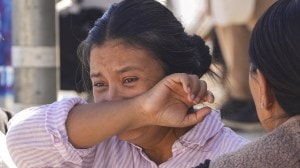The leaving of the Levant
Lebanon—Crouching over a small stone pedestal amid a grove of pines, Maj. Hadi Husseini on Monday quietly marked the imminent end of Sy...

Lebanon—Crouching over a small stone pedestal amid a grove of pines, Maj. Hadi Husseini on Monday quietly marked the imminent end of Syria’s nearly three-decade military presence in Lebanon. He carefully put the finishing touches on a monument he designed, simple and solemn, to memorialise the thousands of Syrian soldiers who have died in his country over the years. ‘‘These red flowers are the symbol for blood,’’ said Husseini, who was nine when Syrian troops rolled into Lebanon in 1976 at a time of a burgeoning civil war. Over the next 29 years, a period scheduled to end officially on Tuesday during a military ceremony at the army post here, at least 2,000 Syrians were killed in Lebanon. A roughhewn foundation stone will be set into Husseini’s shrine, medals exchanged and speeches given by the heads of the Syrian and Lebanese armies. Then the last 600 Syrian soldiers, from a force that once numbered 40,000, will board trucks, buses and rickety jeeps to sweep across the border roughly 10 miles away, ending an era in the Middle East.
No one is clamouring for the Syrians to stay. But neither was there jubilation, especially among the senior military officers and Lebanese civilians who worked with and lived among the Syrian troops here for decades. And some Lebanese expressed frustration over the intense international pressure directed against Syria to end its domineering presence in Lebanon. The final departure marks a retreat that was widely unexpected by Western diplomats and Lebanese officials in the days immediately following Hariri’s death. Syria’s military and intelligence services have almost entirely departed since then.
The withdrawal will mean tighter borders between Lebanon and Syria with the closing of a special access road long used by the military, Lebanese and Syrian dignitaries and well-connected smugglers to avoid the customs outpost. It will also mean import taxes on some goods moving between the two countries and a far larger responsibility for Lebanon’s military in controlling this broad valley where hashish and opium crops flourished before Syria’s arrival. Lebanese army troops, transport trucks and armored-personnel carriers massed at several key intersections around the Bekaa Valley Monday, and filled posts recently vacated by Syrian soldiers. But mutual defence pacts remain in place; the leaders of both countries see Israel as a common foe. Hezbollah has so far declined to give up its formidable arsenal.
In a sign of sympathy, Hezbollah party activists placed party banners and posters on top of a pedestal that until recently held a statue of the late Syrian president Hafez Assad at the entrance to the hillside town of Baalbek.
‘‘This was a brother army, and no body ever complained about it,’’ Elias Farhat, the Lebanese army general who heads its media operation, said as he watched over the parade ground alive with high-stepping Syrian troops, military bands and ranks of Lebanese soldiers practicing for the farewell ceremony. ‘‘The complaints came over the politics. But our cooperation will continue to go on.’’ Farhat, 53, was a young lieutenant in 1976 when Lebanon’s Christian-led government sought Syrian help in corralling fighters from the Palestine Liberation Organization, who had attained military and political power in large parts of the country. The time was far different than today, Farhat said as a light breeze rustled stands of cedars and pines around the post. The Syrian troops were welcome. In 1982, Israeli forces poured across Lebanon’s southern border to end PLO attacks on northern Israeli settlements from the Lebanese side of the frontier. Their march subsequently brought them up against Syrian forces in the Bekaa. Lebanese officers said most of the Syrian soldiers who died here were killed in the subsequent fighting. ‘‘Those were days of war,’’ Farhat said. ‘‘At the time, people here were very happy with their arrival. But times change, people change, alliances change.’’ —LATWP





- 01
- 02
- 03
- 04
- 05


























